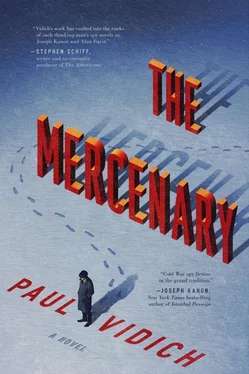Petrov fingered his empty glass and then poured himself another short shot of vodka, ending the pour at an imaginary line. He raised it, examining the clear alcohol. He threw it back, taking it all at once.
“Here in the Soviet Union,” he said, his voice quieter and more philosophical, “if you are arrested, for whatever reason, but particularly for state crimes—” He drew a cutting finger across his neck. “But it could be for any reason, and it’s usually a case of simple luck if you survive. You die in interrogation, or you freeze to death in your cell. You die under the fists of the guards. A favorite pastime among the guards at Solovki Prison Camp is forcing naked prisoners to stand at the edge of a steep drop in bitter-cold weather until they lose balance and fall. Prisoners succumb to disease, hunger, despair. Prisoners lose their will to live, and sadistic guards take up their cudgels. But the traitor in this unlucky group—his arrest comes with a certain outcome. And the men who put the pistol to his head are often his colleagues.”
Petrov drew in a breath. “There are many miserable ways to die if you are arrested, some of them cruel, some absurd, but the man arrested for being a traitor knows how he will go.”
Garin didn’t have to wait to hear what was really on Petrov’s mind.
“Someone in Directorate A suspects classified documents are being copied. Things are now uncomfortable—maybe even dangerous.”
“How do you know?” Garin asked.
“How! It’s obvious.” Petrov slammed his knife blade into the plywood. “For weeks I took reports from the library on the fifth floor of DOM2, and I would copy them on the machine on the seventh floor of DOM1. Now there are new rules. I must sign out documents. There is always a man who looks at my badge and copies down what I am taking. What’s worse is the copier. I had copied the original and returned them, then waited until after work, when no one was around, to film the copies in a closet. Now, every copy I make has to be logged, time stamped, and returned, and if not returned, a written explanation must be given. It’s a new security procedure. Someone suspects something.”
Petrov sank in his chair, morose. “I have gone over and over in my mind why there has been this change. It is highly unusual. There is one logical explanation. Of course, there may be an illogical explanation—it’s a matter of chance—but I am a logical man, and I look for the logic in things. The copies on our machines are given a unique signature—time, date, number. If such a copy were sent to your people, because I had photographed it, and if the signature, or even a copy of the copy, found its way back to Lubyanka, KGB security would know to monitor that one copy machine.”
Garin gazed at Petrov, absorbing the implications of Petrov’s suspicions. Fading light from the dying sun darkened Petrov’s face and made it hard for Garin to gauge the man’s worry.
“It’s possible,” Petrov said, “there is a mole in your headquarters?”
“Five people know of you,” Garin said. “They are all trusted senior men.”
“Yes, but how many experts have seen the documents as part of an evaluation? They would be a different group—military scientists, engineering staff given pieces and asked to verify what I photographed. We both know that is the logical explanation.” Petrov looked at Garin. “You look surprised, but you shouldn’t be. You don’t think there is my counterpart inside the CIA? Passing secrets back? We recruited several. Believe me. Now there may be another.”
Petrov placed several film canisters on the table. “There won’t be more of these, for now. I have to be careful. Everything else I have I will bring with me when I cross the border.”
Petrov’s grim expression softened, and his voice calmed. “There may be a way to use this to our advantage.” He looked at the bare table. “This is when it would be good to eat something. My mind works better on a full stomach. But the shitheads forgot.”
He leaned across the table. “Here is what I think. You don’t know—why would you—Chernenko is dying. He was dying when he was made chairman after Andropov died a year ago, but his end is near. Rivals are at work to position themselves when he goes, and there is a lot of jockeying between the Second and Fifth Chief Directorates. The old guard is getting older, even at the middle level, and we’ve had our fill of ancient Stalinists. Rival deputies are fighting. The rumor is that the next chairman of the Presidium will be the head of the KGB, like Andropov was. Senior men in the First Chief Directorate are aligning under Deputy Chairman Churgin, head of Directorate S, the illegals program.
“My boss is ambitious. Perhaps you have heard his name—Dmitry Posner. Speaks perfect English and has cultivated his foreign credentials and contacts, and rivals have noticed his dishonesty. He is too intellectual and too well-spoken, and he smokes Marlboros while the rest of them choke on Primas. I don’t like him, he doesn’t like me, and his rivals have their knives ready.” Petrov smiled his contempt. “He’s not Russian like me.”
Petrov leaned back in his chair. “I don’t know if he suspects me or if it’s just that he doesn’t like me. Yesterday, he called me into his office and asked why I was making so many copies. He is a careerist, but he’s smart, which makes him dangerous.
“He heard my answer, but I could see that he wasn’t satisfied. We have never been alike, and he has never shown much interest in my work, but now he wants to see everything I do. I suspect my name is on a long list of people who are possible suspects. It doesn’t look good for him if one of his deputies is on the suspect list, and it makes it even more important for him to be vigilant. His career goes up if he exposes a man under him, but his career sinks if someone in another directorate proves security in Posner’s group was lax, and his career crashes if he comes under suspicion. Hundreds of people are suspects at this point. Hundreds of people use that copier. Posner himself has made copies when his assistant was sick—lowering himself to secretarial work. The investigation is tedious, and the process of elimination will be difficult. No one wants to make a mistake, grab the wrong man, and leave the traitor in place. No one wants to find out that their deputy, or the man in the office next door, is the mole.”
“What are you thinking?”
“I think Posner wants to get rid of me.”
“Why do you say that?”
“He’s acting strangely. He’s worried about something.” Petrov pushed forward an invitation with the embossed seal of the United States of America from Ambassador Thomas Propper and his wife to attend the fiftieth-anniversary gala at Spaso House.
“Posner asked me to go. His boss, Deputy Chairman Churgin, gave him two invitations. What?” Petrov stared. “Your face went white. You know him?”
“No.” A lie. “Go on.”
“Posner said, ‘A big honor.’ For my good work. I asked, ‘Why me?’ He said because I’m a smart fellow. When he appeals to my vanity, I know he has something in mind. I said, ‘But I don’t know English.’ He said it doesn’t matter. ‘You’ve been asked to go. Consider it a privilege.’ ”
Petrov looked at Garin. “I have no choice but to go. I will be watched. That is why I’m being invited. I assume that you will be there. You must not approach me. You must not look at me. If the KGB suspect something, I’ll be taken for questioning. I must be invisible.
“I am putting two things together—the change in security at the copier and the invitation. Someone is tightening the noose on my neck. The best way to protect me is to point a finger at someone else.”
Читать дальше












